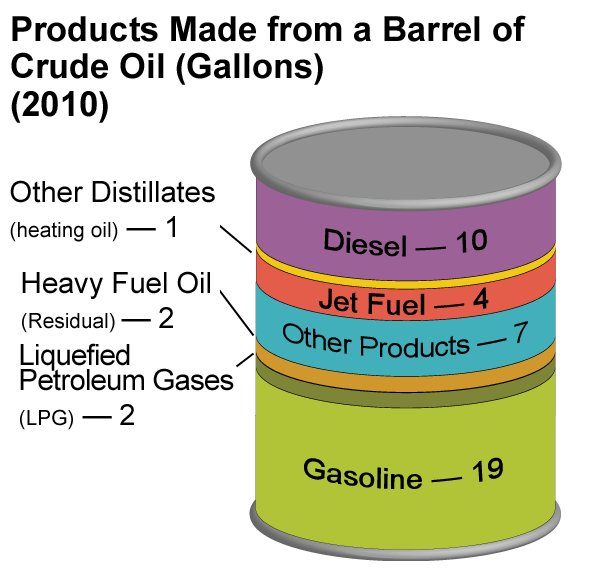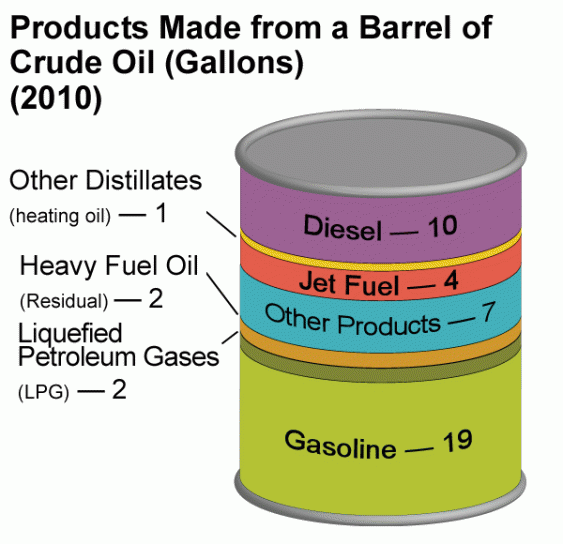If you’re out to raise money for transportation projects, one of the more clever methods is the so-called “barrel fee” that is the centerpiece of Governor Gregoire’s new transportation package. It’s structured in such a way that it minimizes impacts on Washington by effectively off-loading the costs to oil companies and out-of-state drivers. In fact, my back-of-the-envelope estimate is that for every dollar residents pay, the state will net roughly $2.20 in revenue.
Now, whether this is a good thing or a bad thing depends on your point of view. On the one hand, it’s relatively painless for Washington’s residents. On the other hand, by muting the fee’s price signal, it increases the disconnect between drivers and the true cost of the roads we use. There may also be some equity implications for out-of-state fuel users, but more on all that in a moment.
First, here’s how the barrel fee works: the state levies a fee of $1.50 on each barrel of oil that’s refined in Washington for transportation purposes. As a practical matter, oil companies will pass on much of that cost to the state’s consumers. If the cost is fully passed on it would work out to 3.6 cents per gallon of gasoline, diesel, or other fuel. It’s a price increase to be sure, but a relatively modest one—around $19 per year for a typical driver—that’s well within the average weekly fluctuation in gas prices.
Here’s where it gets interesting: Washington refines about twice as much oil as it actually consumes, and the governor’s barrel fee pointedly applies to petroleum products that are sold for consumption outside the state. That means Washington’s coffers can benefit from fees on twice as much oil as Washington consumers will actually pay for. (It’s similar, in some ways, to the way that some natural resource-producing jurisdictions benefit from extraction fees on products that are ultimately used elsewhere.)
So who picks up the other half of the tab?
For products that are refined in Washington but consumed elsewhere, the burden of the fee will fall on some combination of out-of-state consumers and oil refiners (and perhaps some oil distributors or marketers to a small extent). Certainly, the oil companies will try to pass the cost of the fee along to their customers, but in markets that are competitively supplied by other sources of fuel, it may be difficult for them to do so. That means the oil firms will have to carve the cost out of their profits.
And that’s not all. While the barrel fee doesn’t apply to non-transportation petroleum like home heating oil or agricultural diesel, it does extend to fuels that are not touched by conventional gas taxes, such as aviation fuel, asphalt and road oil, lubricants, and the heavy oil that is often used by maritime shippers and railways. The particulars vary for each of these markets, but the upshot is this: only a small fraction of fees on these products will be able to make their way through to ordinary residents, whether in Washington or any other location. That’s a big deal because for every four gallons of transportation fuel produced, refiners also produce somewhere in the neighborhood of one gallon of these products.
Now, let’s imagine a hypothetical barrel of oil under the proposed barrel fee. Perhaps 70 percent of it would be refined into transportation fuel, half of which would be sold to Washington’s consumers and half of which would be sold out-of-state. Another 20 percent or so would be refined into things like aviation fuel and lubricants, where prices can’t easily pass on to consumers. (The remaining 10 percent of refined products would not be touched by the fee.) At the end of the day, Washington consumers would be touched by fees on about 35 percent of a typical barrel of oil, yet the state would reap revenue on 90 percent of the barrel.
That’s a pretty sweet deal for Washington’s residents. It’s not such a sweet deal for oil companies because they will end up eating a sizeable portion of the cost of the fee. And it’s not such a sweet deal for drivers in places like Oregon—where much of Washington’s refined fuel is sold—because they will, in effect, be paying more for fuel in order to fund road projects in Washington.
Part of me likes the idea of the barrel fee, just because it’s so darn clever. But part of me worries that it will seem like another free lunch for the state’s highway megaprojects that seem to soak up available transportation money before road maintenance is paid for. I’d be happier, I suppose, if we were actually paying the cost of building and maintaining the roads we use. If that were to happen, I suspect we’d see fewer new roads, better maintained existing roads, less driving, less energy waste, and perhaps lower transportation taxes to boot.
As for the rest of the transportation package, no comment for now.











Eric de Place
A barrel fee has one other big attraction, of course. It ducks Tim Eyman’s undemocratic (and probably unconstitutional) minority-rule provision put in place by Initiative 1053.
1053 requires a two-thirds vote in the legislature to approve a tax increase, but allows a simple majority vote to approve a fee increase.
Steve M
It also presumably means oil companies will hesitate before building more refineries in Washington. I don’t know how big a deal that is (Are there a lot of jobs associated with refinery business? Are there reasons to want *not* to have refineries nearby?), but it’s an effect I’d expect if this is enacted.
Barry Saxifrage
Why would they want to build more refineries? The oil consumption in our region and nation is falling and the sources of oil are declining. Already the Washington refineries are having to bring in a bunch of tar sands oil from Kinder Morgan Transmountain in BC. Excess capacity at USA refineries is a problem with refineries closing.
Oil is pricing itself out of the USA marketplace. We are looking at a decline not an increase. Isn’t that the whole reason the state needs a new source of highway funding??
morgan
Enviro advocates in Oregon are probably celebrating how this would increase the per mile costs to drive without funding more roads projects.
Oil companies and Ecology lost that RACT case recently. So, we could have two new pressures on the cost of refining in our state.
I heard that PSRC recommended this week that the state build the XBase highway. Not that there’s any money for it or that they can make anything happen on their own, but they’re supposed to be recommending policy that achieves our state’s climate goals.
thanks Eric
Barry Saxifrage
$1.50 a barrel is $3 per tonne of CO2.
BC citizens pay $25 per tonne of CO2 already and it is going to $30 in July. And the public is in favour of that Carbon Tax rate.
The market price of a barrel of oil has gone up $50 in the few years.
I don’t think $1.50 a barrel is going to change any driving habits or be much of a carbon reduction help. If it raises some money for government that seems fine, but isn’t going to be any kind of necessary game changer.